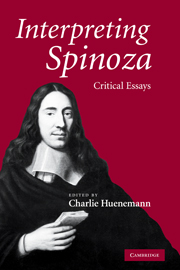Book contents
- Frontmatter
- Contents
- Notes on contributors
- Method of citation
- Introduction
- Chapter 1 Representation and consciousness in Spinoza's naturalistic theory of the imagination
- Chapter 2 Rationalism run amok: representation and the reality of emotions in Spinoza
- Chapter 3 “Whatever is, is in God”: substance and things in Spinoza's metaphysics
- Chapter 4 Necessitarianism in Spinoza and Leibniz
- Chapter 5 Epistemic autonomy in Spinoza
- Chapter 6 Spinoza and the philosophy of history
- Chapter 7 Democracy and the good life in Spinoza's philosophy
- Chapter 8 Spinoza's unstable politics of freedom
- Chapter 9 Should Spinoza have published his philosophy?
- Bibliography
- Index
Chapter 5 - Epistemic autonomy in Spinoza
Published online by Cambridge University Press: 22 September 2009
- Frontmatter
- Contents
- Notes on contributors
- Method of citation
- Introduction
- Chapter 1 Representation and consciousness in Spinoza's naturalistic theory of the imagination
- Chapter 2 Rationalism run amok: representation and the reality of emotions in Spinoza
- Chapter 3 “Whatever is, is in God”: substance and things in Spinoza's metaphysics
- Chapter 4 Necessitarianism in Spinoza and Leibniz
- Chapter 5 Epistemic autonomy in Spinoza
- Chapter 6 Spinoza and the philosophy of history
- Chapter 7 Democracy and the good life in Spinoza's philosophy
- Chapter 8 Spinoza's unstable politics of freedom
- Chapter 9 Should Spinoza have published his philosophy?
- Bibliography
- Index
Summary
One way to distinguish modern philosophy from post-modern philosophy is by the attitude toward epistemic autonomy. Post-modern philosophies maintain that knowledge is inescapably conditioned by social, political, and cultural forces, and an individual's beliefs are forever at the mercy of the torrents that sweep an age: there can be no objectivity, and no authenticity. But the modern philosophies all find some way for individuals to stand free of cultural forces and determine for themselves what is true, perhaps by the aid of some “skyhook” (such as the natural light) which can pull them out of their circumstances and allow them to see what is at the core of metaphysical reality. This rosy assessment of our abilities found its peak in the Enlightenment, of course, for which Kant supplied the famous motto, “Sapere aude! ‘Dare to use your own reason!’” Of course, Kant believed that subtle transcendental reasoning was required to leverage some insight into our true epistemic situation, while the early modern philosophers each posited a more direct avenue to deep truth. The access may have been purely intellectual, or purely empirical, but in any event the access was unmediated and unpolluted by spurious ideology. They found it natural to suppose that some sort of pure perception is required in order for any of us to gain intellectual autonomy, which in turn is what we need in order to establish any kind of political or moral autonomy.
- Type
- Chapter
- Information
- Interpreting SpinozaCritical Essays, pp. 94 - 110Publisher: Cambridge University PressPrint publication year: 2008
- 4
- Cited by



